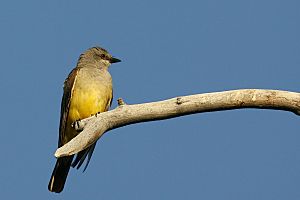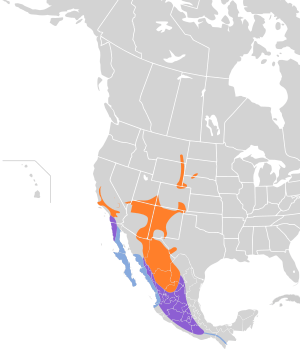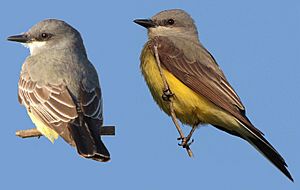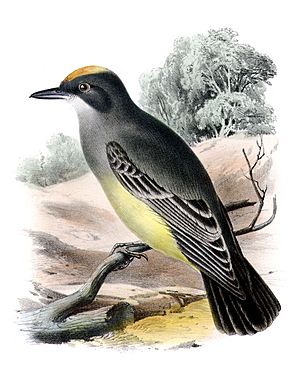Cassin's kingbird facts for kids
Quick facts for kids Cassin's kingbird |
|
|---|---|
 |
|
| Conservation status | |
| Scientific classification |
|
| Kingdom: | Animalia |
| Phylum: | Chordata |
| Class: | Aves |
| Order: | Passeriformes |
| Family: | Tyrannidae |
| Genus: | Tyrannus |
| Species: |
T. vociferans
|
| Binomial name | |
| Tyrannus vociferans Swainson, 1826
|
|
 |
|
| Script error: The function "autoWithCaption" does not exist. | |
Script error: No such module "Check for conflicting parameters".
The Cassin's kingbird (scientific name: Tyrannus vociferans) is a type of large bird. It belongs to a group of birds called tyrant flycatchers. These birds live naturally in western North America. The bird is named after an American bird expert, John Cassin.
Contents
About Its Name
The Cassin's kingbird was officially named in 1826. An English nature expert, William Swainson, gave it its scientific name. This name is Tyrannus vociferans. The word vociferans comes from Latin. It means "shouting" or "loud-voiced." This is a good name because these birds are known for their calls.
Scientists recognize two main types, or subspecies, of Cassin's kingbirds:
- T. v. vociferans Swainson, 1826 – found from the southwest USA to central Mexico.
- T. v. xenopterus Griscom, 1934 – found in southwest Mexico.
What It Looks Like
Adult Cassin's kingbirds have a gray head. Their cheeks are a bit darker. They have a dark tail that is not forked. The tail has a light brown edge. The underside of their body is gray-olive. They have a pale throat and a bright yellow lower chest.
Young Cassin's kingbirds are not as brightly colored. They have pale edges on their wings.
Measurements:
- Length: About 8.3 to 9.1 inches (21 to 23 cm).
- Weight: Around 1.6 ounces (45 grams).
- Wingspan: About 16 inches (41 cm).
Cassin's vs. Western Kingbird
The Cassin's kingbird looks a lot like the western kingbird. But there are some ways to tell them apart. The Cassin's kingbird is a little bigger. Its upper body is also a darker gray.
The easiest way to tell them apart is by their tails. The Cassin's kingbird has a thin white line along the bottom edge of its tail feathers. The western kingbird has a thin white line along the side edge of its tail feathers. You can see this difference in the picture next to this text.
Where It Lives
In the summer, you can find these birds in California. They also live from Montana down to Utah. They are often seen along the eastern Rocky Mountains. They like to live in open areas like rangelands and savannas. These are places with lots of grass and scattered trees.
These birds also migrate, which means they travel long distances. They fly to warmer places for winter. Their winter homes are between Southern California and northern Central America. Some Cassin's kingbirds live all year in south-central Mexico. Their main winter spots are west of the Gulf of California in Baja California Sur. They also winter east of the sea in western Mexico.
Its Habits
Cassin's kingbirds build strong nests. They usually place them on a horizontal tree branch. The nest is often in the middle or top part of a tree. The female bird lays three to five white eggs with spots. The eggs hatch after about 18 to 19 days.
These birds mostly eat insects. They catch insects by watching from a high spot. Then they fly out to grab them in the air. This is called hawking. They also eat some berries and fruits, but not as much.
Their call sounds like a high-pitched "chi-beer." It starts with a short sound followed by a longer one.
Mating Dance
In early spring, Cassin's kingbirds do a special dance. This happens after they have found a mate. They make excited, high-pitched calls. Then, they hover together in the air. Their wings are spread out over a favorite tree branch. This dance happens several times a day for many days. They do it in a few different spots. These spots cover an area of about 2 to 3 acres (8,000 to 12,000 square meters). The places they choose for their dance are often the same spots they use for hunting later in spring and summer.
See also
 In Spanish: Tirano gritón para niños
In Spanish: Tirano gritón para niños
 | William Lucy |
 | Charles Hayes |
 | Cleveland Robinson |




